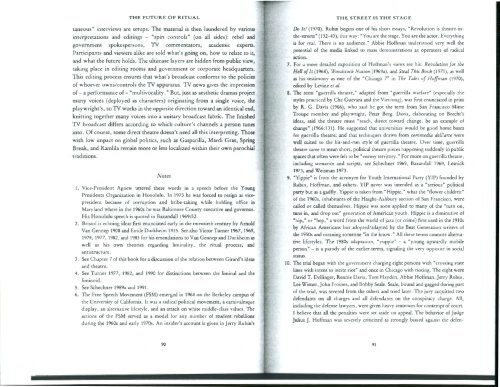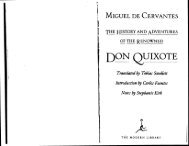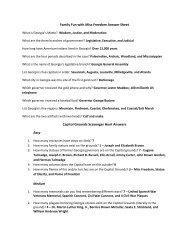schechner_the street is the stage.pdf - University of Georgia Libraries
schechner_the street is the stage.pdf - University of Georgia Libraries
schechner_the street is the stage.pdf - University of Georgia Libraries
Create successful ePaper yourself
Turn your PDF publications into a flip-book with our unique Google optimized e-Paper software.
"",T""<br />
THE FUTURE OF RITUAL<br />
taneous" interviews are setups. The material <strong>is</strong> <strong>the</strong>n laundered by various<br />
interpretations and editings - "spin controls" (on all sides): rebel and<br />
government spokespersons, TV commentators, academic experts.<br />
Participants and viewers alike are told what's going on, how to relate to it,<br />
and what <strong>the</strong> future holds. The ultimate layers are hidden from public view,<br />
taking place in editing rooms and government or corporate headquarters.<br />
Th<strong>is</strong> editing process ensures that what's broadcast conforms to <strong>the</strong> policies<br />
<strong>of</strong> whoever owns/controls <strong>the</strong> TV apparatus. TV news gives <strong>the</strong> impression<br />
<strong>of</strong>- a performance <strong>of</strong>- "multivocality." But, just as aes<strong>the</strong>tic dramas project<br />
many voices (deployed as characters) originating from a single voice, <strong>the</strong><br />
playwright's, so TV works in <strong>the</strong> opposite direction toward an identical end,<br />
knitting toge<strong>the</strong>r many voices into a unitary broadcast fabric. The fin<strong>is</strong>hed<br />
TV broadcast differs according to which culture's channels a person tunes<br />
into. Of course, some direct <strong>the</strong>atre doesn't need all th<strong>is</strong> interpreting. Those<br />
with low impact on global politics, such as Gasparilla, Mardi Gras, Spring<br />
Break, and Ramlila remain more or less localized within <strong>the</strong>ir own parochial<br />
traditions.<br />
Notes<br />
I. Vice-President Agnew uttered <strong>the</strong>se words in a speech before <strong>the</strong> Young<br />
Presidents Organization in Honolulu. In 1973 he was forced to resign as vicepresident<br />
because <strong>of</strong> corruption and bribe-taking while holding <strong>of</strong>fice in<br />
Maryland where in <strong>the</strong> 1960s he was Baltimore County executive and governor.<br />
H<strong>is</strong> Honolulu speech <strong>is</strong> quoted in Baxandall 1969:52.<br />
2. Br<strong>is</strong>tol <strong>is</strong> echoing ideas first enunciated early in <strong>the</strong> twentieth century by Arnold<br />
Van Gennep 1908 and Emile Durkheim 1915. See also Victor Turner 1967, 1969,<br />
1974, 1977, 1982, and 1983 for h<strong>is</strong> emendations to Van Gennep and Durkheim as<br />
well as h<strong>is</strong> own <strong>the</strong>ories regarding liminality, <strong>the</strong> ritual process, and<br />
ant<strong>is</strong>tructure.<br />
3. See Chapter 7 <strong>of</strong> th<strong>is</strong> book for a d<strong>is</strong>cussion <strong>of</strong> <strong>the</strong> relation between Girard's ideas<br />
and <strong>the</strong>atre.<br />
4. See Turner 1977, 1982, and 1990 for d<strong>is</strong>tinctions between <strong>the</strong> liminal and <strong>the</strong><br />
liminoid.<br />
5. See Schechner 1989a and 1991.<br />
6. The Free Speech Movement (FSM) emerged in 1964 on <strong>the</strong> Berkeley campus <strong>of</strong><br />
<strong>the</strong> <strong>University</strong> <strong>of</strong> California. It was a radical political movement, a carnivalesque<br />
d<strong>is</strong>play, an alternative lifestyle, and an attack on white middle-class values. The<br />
actions <strong>of</strong> <strong>the</strong> FSM served as a model for any number <strong>of</strong> student rebellions<br />
during <strong>the</strong> 1960s and early 1970s. An insider's account <strong>is</strong> given in Jerry Rubin's<br />
90<br />
1<br />
ir<br />
~<br />
~-<br />
t<br />
t<br />
i:<br />
~ ·<br />
i,<br />
THESTREETISTHESTAGE<br />
Do It! (1970). Rubin begins one <strong>of</strong> h<strong>is</strong> short essays, "Revolution <strong>is</strong> <strong>the</strong>atre-in<strong>the</strong>-<strong>street</strong>s"<br />
(132--43), th<strong>is</strong> way: "You are <strong>the</strong> <strong>stage</strong>. You are <strong>the</strong> actor. Everything<br />
<strong>is</strong> for real. There <strong>is</strong> no audience." Abbie H<strong>of</strong>fman understood very well <strong>the</strong><br />
potential <strong>of</strong> <strong>the</strong> media linked to mass demonstrations as operators <strong>of</strong> radical<br />
action.<br />
7. For a more detailed exposition <strong>of</strong> H<strong>of</strong>fman's views see h<strong>is</strong>: Revolution for <strong>the</strong><br />
Hell <strong>of</strong> It (1968), Woodstock Nation (1969a), and Steal Th<strong>is</strong> Book (1971), as well<br />
as h<strong>is</strong> testimony as one <strong>of</strong> <strong>the</strong> "Chicago 7" in The Tales <strong>of</strong> H<strong>of</strong>fman (1970),<br />
edited by Levine et a/.<br />
8. The term "guerrilla <strong>the</strong>atre," adapted from "guerrilla warfare" (especially <strong>the</strong><br />
styles practiced by Che Guevara and <strong>the</strong> Vietcong), was first enunciated in print<br />
by R. G. Dav<strong>is</strong> (1966), who said he got <strong>the</strong> term from San Franc<strong>is</strong>co Mime<br />
Troupe member and playwright, Peter Berg. Dav<strong>is</strong>, elaborating on Brecht's<br />
ideas, said <strong>the</strong> <strong>the</strong>atre must "teach, direct toward change, be an example <strong>of</strong><br />
change" (1966: 131 ). He suggested that universities would be good home bases<br />
for guerrilla <strong>the</strong>atre; and that techniques drawn from commedia dell'arte were<br />
well suited to <strong>the</strong> hit-and-run style <strong>of</strong> guerrilla <strong>the</strong>atre. Over time, guerrilla<br />
<strong>the</strong>atre came to mean short, political <strong>the</strong>atre pieces happening suddenly in public<br />
spaces that <strong>of</strong>ten were felt to be "enemy territory." For more on guerrilla <strong>the</strong>atre,<br />
including scenarios and scripts, see Schechner 1969, Baxandall 1969, Lesnick<br />
1973, and We<strong>is</strong>man 1973.<br />
9. "Yippie" <strong>is</strong> from <strong>the</strong> acronym for Youth International Party (YIP) founded by<br />
Rubin, H<strong>of</strong>fman, and o<strong>the</strong>rs. YIP never was intended as a "serious" political<br />
party but as a gadfly. Yippie <strong>is</strong> taken from "Hippie," what <strong>the</strong> "flower children"<br />
<strong>of</strong> <strong>the</strong> 1960s, inhabitants <strong>of</strong> <strong>the</strong> Haight- Ashbury section <strong>of</strong> San Franc<strong>is</strong>co, were<br />
called or called <strong>the</strong>mselves. Hippie was soon applied to many <strong>of</strong> <strong>the</strong> "turn on,<br />
tune in, and drop out" generation <strong>of</strong> American youth. Hippie <strong>is</strong> a diminutive <strong>of</strong><br />
"hip," or "hep," a word from <strong>the</strong> world <strong>of</strong> jazz (or crime) first used in <strong>the</strong> 1910s<br />
by African Americans but adopted/adapted by <strong>the</strong> Bear Generation writers <strong>of</strong><br />
<strong>the</strong> 1950s and meaning someone "in <strong>the</strong> know." All <strong>the</strong>se terms connote alternative<br />
lifestyles. The 1980s adaptation, "yuppie" - a "young upwardly mobile<br />
person"- <strong>is</strong> a parody <strong>of</strong> <strong>the</strong> earlier terms, signaling <strong>the</strong> very opposite in social<br />
status.<br />
10. The trial began with <strong>the</strong> government charging eight persons with "crossing state<br />
lines with intent to incite riot" and once in Chicago with rioting. The eight were<br />
David T. Dellinger, Rennie Dav<strong>is</strong>, Tom Hayden, Abbie H<strong>of</strong>fman, Jerry Rubin,<br />
Lee Wiener, John Froines, and Bobby Seale. Seale, bound and gagged during part<br />
<strong>of</strong> <strong>the</strong> trial, was se,•ered from <strong>the</strong> o<strong>the</strong>rs and tried later. The jury acquitted two<br />
defendants on all charges and all defendants on <strong>the</strong> conspiracy charge. All,<br />
including <strong>the</strong> defense lawyers, were given heavy sentences for contempt <strong>of</strong> court.<br />
I believe that all <strong>the</strong> penalties were set aside on appeal. The behavior <strong>of</strong> Judge<br />
Julius J. H<strong>of</strong>fman was severely criticized as strongly biased against <strong>the</strong> defen-<br />
91<br />
1,~




